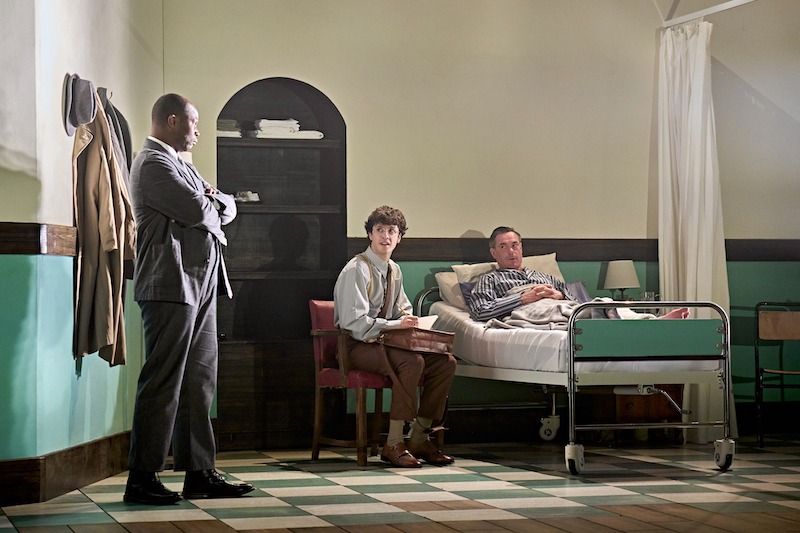Writer: M. Kilburg Reedy
Director: Jenny Eastop
Not many theatre performances begin with the distribution of a medieval family tree, but M. Kilburg Reedy’s adaptation of The Daughter of Time requires an intimate knowledge of Richard III’s alleged crimes, Shakespeare’s text and the history of the Wars of the Roses. Based on Josephine Tey’s novel, this rather flat adaptation struggles to find theatricality in its largely stationary and repetitious rehashing of Richard’s life, while its central characters – a bedbound detective and an actress who wants to marry him – feel considerably less real than the 400-year-old king.
Recovering from an operation that has left him hospitalised and immobile, Detective Grant’s boredom is alleviated when he starts to investigate what he believes is the flimsy case against Richard III, sending others to do research while he cogitates from his bed. Determined to prove Richard’s innocence, Grant becomes relentless, almost missing a chance for true happiness with an old friend.
Reedy’s page-to-stage translation is pretty dry and is unable to shed its heavy narrative content, finding little jeopardy in the discussions of Yorkist monarchs or really exploring why the detective becomes so obsessed. Determined that Shakespeare’s chain of evidence is insubstantial and based on sources created after the fact, it makes no more sense that Grant’s entire case is built on a portrait of the dead king and the lack of criminality he perceives in his face.
Although this is Tey’s original story, there is no questioning of the portrait – itself created at an unknown date, perhaps not even in Richard’s lifetime – nor is the story updated to reflect the recent scholarship on the skeleton in the Leicestershire carpark that confirms Shakespeare’s curvature claim. This story may be set in 1950, but it still includes doubts about that aspect of the text.
One of the issues here is that The Daughter of Time feels like an extended history lecture, spending three hours going over and demolishing the case against Richard, but there are never any setbacks or cause for Grant to doubt the assumption he made at the start. What makes for interesting reading or perhaps an intriguing podcast debate doesn’t translate as drama when the same facts about Richard, his life and his family are repeated over and over. And it pales the lives of the thinly drawn characters on stage, along with any sense of their development. The only plot point is waiting for Grant to realise he loves Marta, who tries to make him jealous with actor-friend Nigel playing Richard III at the Old Vic.
Director Jenny Eastop doesn’t help matters by setting the entire play at the back of the stage on Bob Sterrett’s fixed hospital room set and completely avoiding the front third of the space where the actors might better connect with the audience and help some of them project. And there is very little the cast can do with their roles; Rob Pomfret is a blustering bachelor as Grant able to solve a centuries old mystery but unable to deduce his own emotional life, Rachel Pickup is a forbearing Marta but manages immense dignity particularly when quoting verse while Harrison Sharpe as researcher Brent adds an exuberance and energy missing from anywhere else in the production.
The show needs some tightening, cutting some of the extended historical discussions and refocusing on the characters that we see. After all, Grant’s investigation is a chance to discover more about himself and find his own way to a happier ending.
Runs until 13 September 2025
